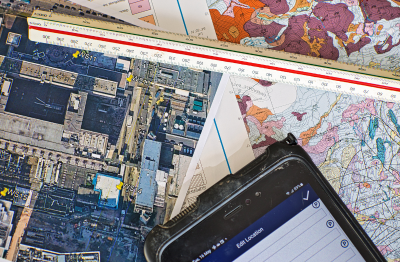

Geo-environmental
Igne’s geo-environmental services de-risk client projects by providing a thorough understanding of ground conditions, ensuring deadlines and budgets are protected.
uNDERSTANDING
Land Contamination Risk Management
Land contamination risk management/assessment is a staged process running from initial desk-based research through intrusive investigation to remediation and validation.
Depending on the levels of contamination detected, it may not be necessary to complete all of the stages.

Stage 1: Risk Assessment
1 Preliminary Risk Assessment (PRA)
PRAs utilise site reconnaissance and numerous information sources to determine the historical, geological, and environmental setting of your site.
Ultimately, an initial conceptual site model (CSM) is developed which identifies sources of contamination, exposure pathways and receptors which could be adversely affected by contamination (contaminant linkages).
As well as contamination, the PRA will also highlight other geo-environmental risks such as coal mining, ground gas, flood risk and UXO and provide recommendations for further investigation and assessment.
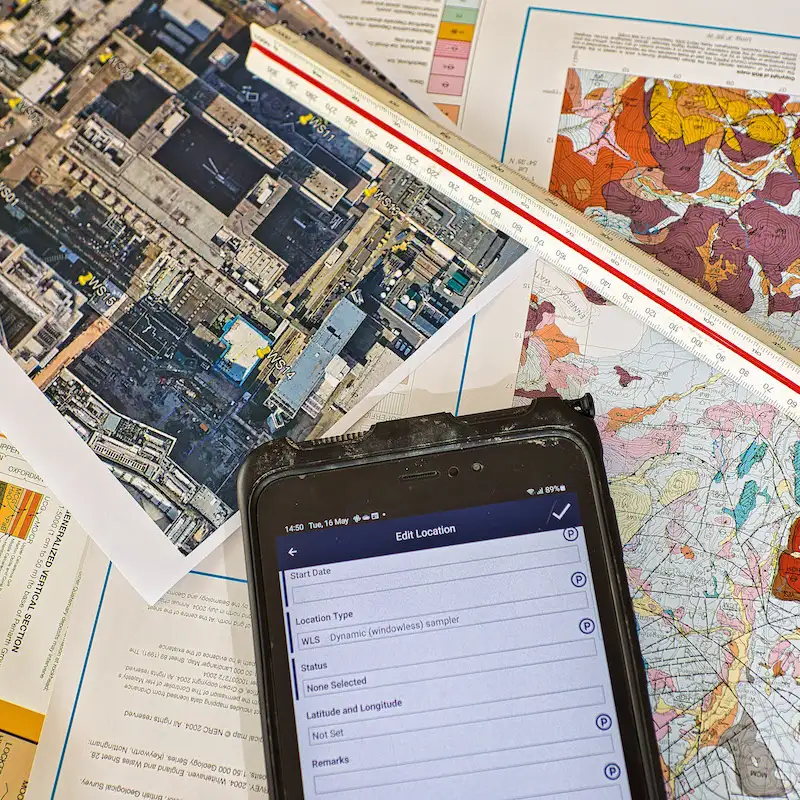
2 Generic Quantitative Risk Assessment
Based on the findings of the PRA, Igne can design and undertake intrusive investigation of your site to obtain data on the ground profile and recover samples for laboratory contamination testing. Investigations can be designed to provide not only contamination information, but also information relating to foundation design, ground gas and coal mining risk.
The results of laboratory contamination assessment of soil and groundwater are compared to published generic assessment criteria (GAC). The assessment may conclude that no further action is needed, or that a Detailed Quantitative Risk Assessment or Remediation is required.
3 Detailed Quantitative Risk Assessment
Further assessment of existing laboratory data, often supplemented by further intrusive investigation and testing, may be undertaken to provide a greater understanding of the risk. Igne can derive site specific assessment criteria based on parameters obtained during investigation data and also undertake fate and transport modelling.
The assessment may conclude that no further action is needed, or that Remediation is required.
Remediation Options Appraisal
If the levels of contamination at your site have been assessed and found to be unacceptable, Igne can help by identify and evaluating various remedial techniques to determine the most-practicable.
Igne is fully independent and has no ties with remediation contractors, allowing it to explore the full breadth of remediation technologies available. This enables Igne to select the most appropriate solution for your site.
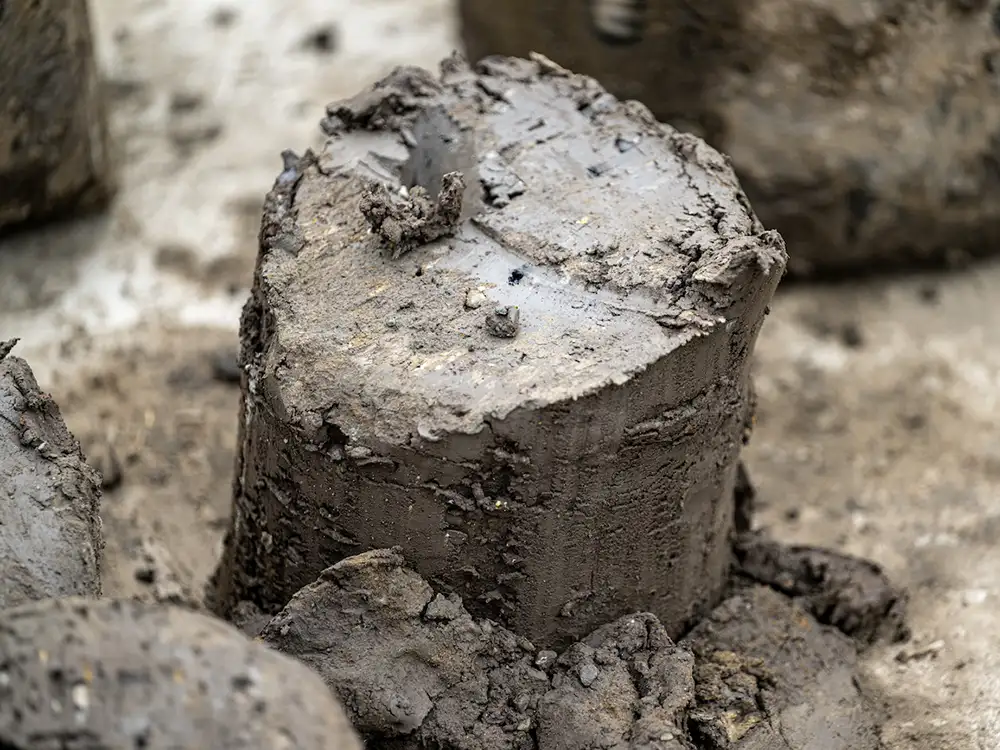
Stage 2:
Remediation and Verification
1 Remediation Strategy:
Igne can prepare a remediation strategy for your site which clearly defines the remedial activities to be undertaken and the ways in which their effectiveness will be verified.
2 Remediate:
Remediation can be managed and supervised by Igne to ensure that works are progressing in accordance with the strategy and undertake validation sampling
3 Verification Report:
Igne can prepare a verification report detailing the remedial works undertaken and providing evidence that they have been successful and that no further action is required.
4 Long Term Monitoring:
If identified within the remedial strategy, Igne can undertake long-term monitoring to confirm natural attenuation of contamination or post-remediation monitoring to form part of the verification works.
informed, in-depth, integrated
Contact Igne’s experts today for an obligation-free conversation about your remediation goals.

Coal Mining
Large parts of the UK are underlain by historical coal mines. As part of the planning process, sites within defined Development High Risk Areas require a Coal Mining Risk Assessment (CMRA) to be submitted. Igne can compile information from the Coal Authority, historical maps, geological maps and other relevant sources to produce a CMRA. Therein we assess the risk posed to a proposed development by historical mining features, including mine shafts and underground workings.
Where the CMRA identifies a potential risk from historical mining, Igne can undertake geophysical and/or intrusive investigation to locate reported mine shafts and confirm the presence or absence of shallow mine workings.
If necessary, Igne can undertake treatment of shallow mine workings and/or mine shafts, typically by injection of grout. These works include negotiations with the Coal Authority and preparation of a Validation Report on completion
All mining related investigation and treatment in the UK is undertaken under an appropriate permit obtained from the Coal Authority.
Surveys
Igne can undertake a topographic survey of your site to produce a detailed CAD drawing showing levels and the locations of site features.
Buried utilities can cause disruptions and obstructions to your project. Therefore, it is important to locate them prior to project commencement.
Igne can locate and map buried utilities, such as water pipes, gas lines, electric cables, telecommunications infrastructure, and sewer systems using the following methods:
- Utility records are obtained from statutory providers
- Igne can utilise specialist ground penetrating radar (GPR) and electromagnetic equipment in order to locate and map detectable services and provide you with valuable information about the location and type of buried utilities on your site.
- Where required, Igne can conduct excavations to visually inspect and verify the presence and location of buried utilities. The excavations are completed using hand-tools or vacuum excavation.
Foundation and Pavement Design
Foundation design – Igne can determine appropriate foundation solutions for your proposed structures and provide parameters for detailed design
Pavement design – Igne can also provide design parameters for pavement design based on in situ testing results
Ecology Services
Igne can undertake Stage 1 Preliminary Ecological Appraisals for proposed development sites, these include an ecological desk study as well as a habitat survey. If evidence of a protective species is found then a Stage 2 Ecological Impact Assessment will be required in order to continue with the development. This may include botanical surveys, or surveys for species such as breeding birds, bats, great crested newts, water voles, badgers, and reptiles. Potential impacts of the development will be identified and appropriate mitigation measures will be recommended.
Archaeology Services
Any development project that could harm the protection of historic sites and features will require an archaeological survey. Igne can assist clients in providing archaeological surveys if required, in order to support planning applications.
Landfill Services
Igne can provide monitoring support for landfill operators and have experience of following long term monitoring management plans for licensed facilities in accordance with permits, local agreements and approved documents. This includes regular site visits to monitor gas, groundwater, surface water and leachate, with the provision of regular data submissions. Igne can also provide waste classification reports to determine whether incoming waste is non-hazardous or hazardous based upon its chemical composition.
Slope Stability Assessment
Igne’s in-house team of experts can evaluate the stability of natural or engineered slopes, such as on hillsides, cliffs, embankments, or excavation sites. By analysing the stability of a slope, slope failures and landslides can be avoided.
Igne’s assessment analyses the geological, geotechnical, and hydrological data of a slope to better understand it, identify any risks, and to design mitigation measures.
Environmental Auditing and Appraisal
Igne can audit the process at your site to ensure compliance with environmental regulations. We produce reports detailing the findings and actions required to rectify any non-conformances.
Igne can also review third party professional reports, such as ground investigation reports, to provide updated recommendations following changes in guidance, provide a second opinion, or to provide further options for investigation/remediation.
Igne can also review or provide in-house…
- Material Management Plans (MMP): plans that outline the procedures, guidelines, and strategies for effectively managing materials throughout the lifecycle of a construction project. Igne’s MMPs assist in resource optimisation, cost control, environmental sustainability, supply chain management, and risk management.
- Site Waste Management Plans (SWMP):
For Igne's geo-environmental services, clients include:
Asda, Co-Op, Morrisons, Burger King, Sainsburys, Lidl, Aldi, Tesco, Welcome Break, MacDonalds, Wickes, B&Q, Travis Perkins, Homebase, The Crown Estate, The Duchy of Lancaster, Persimmon, British Land, Shell, Taylor Wimpey.

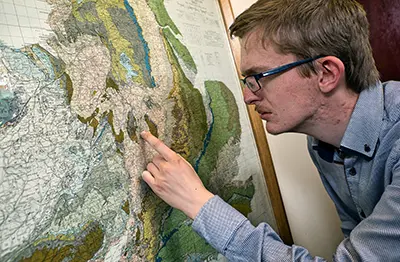
Remediation Options Appraisal
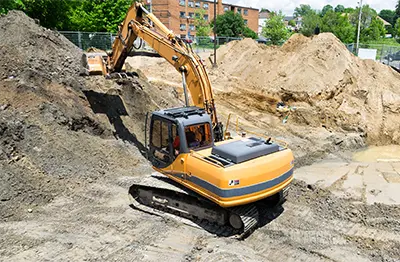
Remediation & Verification
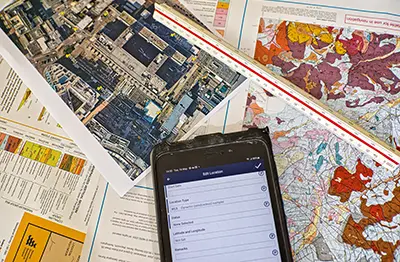
Technical Advice & Services
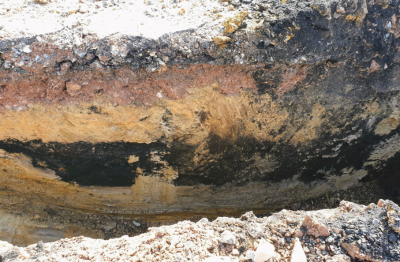
Environmental Auditing & Appraisal
For more information regarding any of our geo-environmental solutions, contact Igne today
Email: hello@igne.comCall: 0371 789 1000
